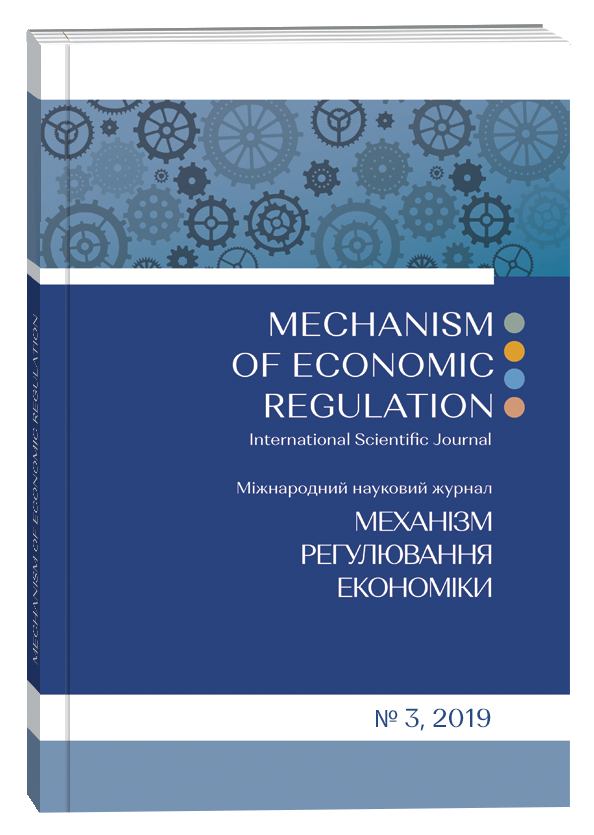ECONOMIC AND SOCIO-POLITICAL FORCE MAJEURE: A STUDY OF THE UKRAINIAN STOCK MARKET REACTION
Abstract
The paper analyzes the reactions on the Ukrainian stock market to force majeure events of an economic and socio-political nature. Unforeseen events are regards as force majeure events, which can not be taken into account in the value of assets in the stock market in advance. It has been established that, as a result, conditions for obtaining anomalous profit market participants may be created, until information on force majeure will be absorbed by the stock market. In this context, force majeure is seen as an anomaly of the hypothesis of effective markets. Among the most significant economic events, a number of corporate bankruptcies and cyberattacks were taken into account, and among socio-political force majeures – revolutionary, military-political events and terrorist acts. On the basis of daily data for the main index of the stock market of Ukraine (PFTS) for the period from 01.01.1997 to 31.12.2018, a hypothesis was checked regarding whether or not the force majeure events create temporary market anomalies and whether there are profitable trading strategies based on their use. The methodological basis for testing was not only the traditional t-criterion of the Student (as a hypothesis test method) but also cumulative accumulated income methods as one of the methods of studying events and trading simulations. According to the results of the audit, the Ukrainian stock market reacts very quickly to economic and socio-political force majeures and absorbs information about them. Negative profitability of the PFTS index was observed only on the day of the occurrence of a force majeure event. Despite the existence of the revealed model of the stock market reaction to force majeure events (namely, price reduction on the day of the event), it is not possible to build profitable trading strategies based on this model, since the results of simulation of these strategies do not differ from those generated random trade.
References
Arin, K. The price of terror: The effects of terrorism on stock market returns and volatility / K. Arin, D. Ciferri, N. Spagnolo // Economics Letters. – 2008. – № 101. – Р. 164–167. 10.1016/j.econlet.2008.07.007.
Ball, R. An Empirical Evaluation of Accounting Income Numbers / R. Ball, P. Brown // Journal of Accounting Research. – 1968. – № 6(2). – Р. 159–78.
Brounen, D. The Impact of Terrorist Attacks on International Stock Markets [Electronic resource] / D. Brounen, J. Derwall // European Financial Management. – 2010. – № 16(4). – Р. 585–598. – Accessed mode : http://dx.doi.org/10.1111/j.1468-036X.2009.00502.x.
Campbell, K. The Economic Cost of Publicly Announced Information Security Breaches: Empirical Evidence from the Stock Market / K. Campbell, L. A. Gordon, M. P. Loeb, L. Zhou // Journal of Computer Security. – 2003. – № 11. – Р. 431–448.
Chambers, A. Timeliness of Reporting and the Stock Price Reaction to Earnings Announcements / A. Chambers, S. Penman // Journal of Accounting Research. – 1968. – № 22(1). – Р. 21–47. doi:10.2307/2490700.
Chaudhry, N. Impact of terrorism on stock markets: Empirical evidence from the SAARC region / N. Chaudhry, D. Roubaud, W. Akhter, M. Shahbaz [Electronic resource] // Finance Research Letters. – Accessed mode : http://dx.doi.org/10.1016/j.frl.2018.02.024.
Chen, A. H. The effects of terrorism on global capital markets / A. H. Chen, T. F. Siems // European Journal of Political Economy. – 2004. – № 2. – Р. 349–366.
Cready, W. Aggregate Market Reaction to Earnings Announcements [Electronic resource] / W. Cready, U. Gurun // Journal of Accounting Research. – 2010. – № 48(2). – Р. 289–334. – Accessed mode : http://www.jstor.org/stable/40784950.
Drakos, K. Terrorism activity, investor sentiment, and stock returns / K. Drakos // Review of Financial Economics. – 2010. – № 19(3). – Р. 128–135.
Falk, H. Market Reaction to Quarterly Earnings' Announcements: A Stochastic Dominance Based Test of Market Efficiency [Electronic resource] / H. Falk, H. Levy // Management Science. – 1989. – № 35(4). – Р. 25–446. – Accessed mode : http://www.jstor.org/stable/2631890.
Fama, E. The Adjustment of Stock Prices to New Information / E. Fama et al. // International Economy Review . – 1969. – № 10(1). – Р. 1–21.
Fama, E. F. Efficient markets: A review of theory and empirical work / E. F. Fama // Journal of Finance . – 1970. – № 25(2). – Р. 383–417.
Karolyi, A. Terrorism and the Stock Market / A. Karolyi, R. Martell // International Review of Applied Financial Issues and Economics. – 2010. – № 2. – Р. 285–314.
Knight, R. F. Corporate Catastrophes, Stock Returns, and Trading Volume / R. F. Knight, J. F. Pretty / Corporate Reputation Review. – 1999. – № 2(4). – Р. 363–378.
Lonie, A. A. The stock market reaction to dividend announcements: A UK study of complex market signals [Electronic resource] / A. A. Lonie, G. Abeyratna, D. M. Power, C. D. Sinclair // Journal of Economic Studies. – 1996. – № 23(1). – Р. 32–52. – Accessed mode : https://doi.org/10.1108/01443589610106534.
MacKinlay, A. C. Event Studies in Economics and Finance / A. C. MacKinlay // Journal of Economic Literature. – 1997. – № 35. – Р. 13–39.
Syed, A. M. Earnings announcements, stock price reaction and market efficiency – the case of Saudi Arabia [Electronic resource] / A. M. Syed, I. A. Bajwa // International Journal of Islamic and Middle Eastern Finance and Management. – 2018. – № 11(3). – Р. 416–431. – Accessed mode : https://doi.org/10.1108/IMEFM-02-2017-0044.
Pysarenko, S., Alexeev, V., Tapon F., (2019) Predictive blends: Fundamental Indexing meets Markowitz. Journal of Banking & Finance, 100, 28-42, https://doi.org/10.1016/j.jbankfin.2018.12.016.


